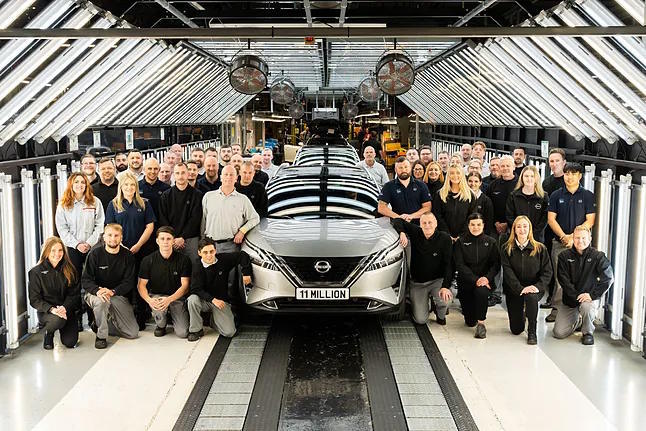Last Tuesday, the Japanese company Nissan unveiled a dramatic restructuring plan: by spring 2027, it will cut up to 20,000 jobs - 15% of its global workforce - and close seven out of 17 car factories, representing 30% of its installed capacity, excluding China.
The restructuring plan had been previously announced in November by the former CEO of the company, Makoto Uchida. However, his successor, Mexican Iván Espinosa, had to make further cuts after Nissan reported a net loss of 4.080 billion euros for the fiscal year 2024/2025, compared to a profit of 2.600 billion euros the previous year.
At that time, Espinosa did not specify the geographical distribution of the cuts. However, the impact could be less severe thanks to the assistance... from China. Specifically, from Dongfeng, the giant with which Nissan has been allied for over two decades.
The discussion includes the possibility of utilizing Nissan's factories outside of China. For example, the plant in Sunderland, United Kingdom, the only one in Europe after the closure of the Spanish plant in Zona Franca, which employs over 6,000 workers. Or the two plants in the United States. This move would allow Dongfeng to avoid tariffs that penalize Chinese cars in Europe (except for 100% electric models) and in the United States.
"Everything is on the table," stated Espinosa to the Financial Times, who also confirmed that a Chinese company could be an option in the search for a strategic partner after failed merger negotiations with Honda, a Japanese company. The gap between Nissan and Renault, their historic ally since 1999, continues to widen.
Since the arrest of Carlos Ghosn in 2018, both companies have sought to rebalance their alliance, and although they continue to collaborate, recent actions have been clear. The French company has taken over their joint business in the crucial Indian market, released Nissan from the investment it was going to make in Ampere, Renault's electric division, and both have agreed to potentially reduce their cross-shareholdings by up to 10%.
Renault is interested in Nissan's success, with or without Nissan: under the current structure, Nissan's poor performance in 2024 resulted in Renault having to record losses of 2.000 billion euros. Despite being one of Renault's major profit contributors in the past.
The challenge with Dongfeng lies in its status as a state-owned manufacturer. Founded in 1969, the company sold nearly 2.5 million vehicles in 2023 and entered the Spanish market last year with the launch of three brands: Dongfeng, Voyah, and MHero, the latter two being premium brands.
Dongfeng was previously a historic partner of PSA (Peugeot Citroën) in China and became one of its major shareholders - on par with the French government - when it came to the company's rescue in 2014. Today, with PSA integrated into Stellantis and after several share sales, Dongfeng holds a 1.5% stake in the conglomerate.
In Nissan's case, their collaboration dates back to 2003 when both companies jointly established the joint venture Dongfeng Nissan (known as DFL). The venture operates seven factories in China, focusing on producing Japanese models for the local market, also under the Venucia brand.
While the idea of sharing global factory networks is not new, at least in Europe, it is also being considered in the case of Volkswagen or Audi, both under pressure due to sluggish electric vehicle sales.
Two weeks ago, it was reported that the Chery Group is exploring the use of VW plants in Germany to expand its industrial activities in Europe, which began with the takeover of the factory Nissan closed in Zona Franca, Barcelona in 2021. The plant now produces models for the revived Spanish brand Ebro and will add its own brands Omoda and Jaecoo by the end of the year.
Interestingly, the joint venture between Nissan and Dongfeng is one of the three partners behind the project to revive the historic Santana Motor factory in Linares (Jaén). Closed in 2011, the plan is to manufacture "next-generation diesel and plug-in hybrid 4x4 vehicles" for sale in Europe, Africa, and America.
These are mutually beneficial moves. Europe reduces its excess production capacity, exacerbated by being the region where production has fallen the most since 2019, by 18.9%.
For Chinese manufacturers, renting or buying existing plants is a quick and cost-effective way to establish a presence. However, this is always under the supervision of the government, which owns Dongfeng and aims to prevent investments in countries that impose tariffs on Chinese cars.
